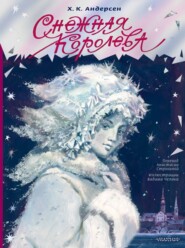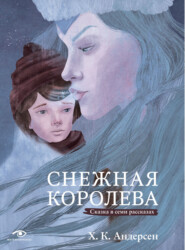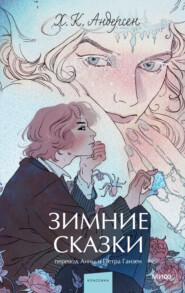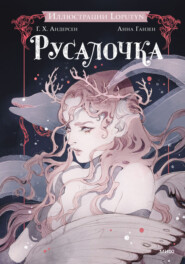По всем вопросам обращайтесь на: info@litportal.ru
(©) 2003-2024.
✖
Hans Andersen's Fairy Tales. First Series
Настройки чтения
Размер шрифта
Высота строк
Поля
And then she took two flowers out of her wreath and kissed them, and they shone first like silver and then like gold, and as she placed them on the heads of the old people, each flower became a golden crown. And there they sat like a king and queen under the sweet-scented tree, which still looked like an elder bush. Then he related to his old wife the story of the Elder-tree Mother, just as he had heard it told when he was a little boy, and they both fancied it very much like their own story, especially in parts which they liked the best.
"Well, and so it is," said the little maiden in the tree. "Some call me Elder Mother, others a dryad, but my real name is Memory. It is I who sit in the tree as it grows and grows, and I can think of the past and relate many things. Let me see if you have still preserved the flower."
Then the old man opened his hymn book, and there lay the elder flower, as fresh as if it had only just been placed there, and Memory nodded. And the two old people with the golden crowns on their heads sat in the red glow of the evening sunlight and closed their eyes, and – and – the story was ended.
The little boy lay in his bed and did not quite know whether he had been dreaming or listening to a story. The teapot stood on the table, but no elder bush grew out of it, and the old man who had really told the tale was on the threshold and just going out at the door.
"How beautiful it was," said the little boy. "Mother, I have been to warm countries."
"I can quite believe it," said his mother. "When any one drinks two full cups of elder-flower tea, he may well get into warm countries"; and then she covered him up, that he should not take cold. "You have slept well while I have been disputing with the old man as to whether it was a real story or a fairy legend."
"And where is the Elder-tree Mother?" asked the boy.
"She is in the teapot," said the mother, "and there she may stay."
THE SNOW QUEEN
STORY THE FIRST
WHICH DESCRIBES A LOOKING-GLASS AND ITS BROKEN FRAGMENTS
YOU must attend to the beginning of this story, for when we get to the end we shall know more than we now do about a very wicked hobgoblin; he was one of the most mischievous of all sprites, for he was a real demon.
One day when he was in a merry mood he made a looking-glass which had the power of making everything good or beautiful that was reflected in it shrink almost to nothing, while everything that was worthless and bad was magnified so as to look ten times worse than it really was.
The most lovely landscapes appeared like boiled spinach, and all the people became hideous and looked as if they stood on their heads and had no bodies. Their countenances were so distorted that no one could recognize them, and even one freckle on the face appeared to spread over the whole of the nose and mouth. The demon said this was very amusing. When a good or holy thought passed through the mind of any one a wrinkle was seen in the mirror, and then how the demon laughed at his cunning invention.
All who went to the demon's school – for he kept a school – talked everywhere of the wonders they had seen, and declared that people could now, for the first time, see what the world and its inhabitants were really like. They carried the glass about everywhere, till at last there was not a land nor a people who had not been looked at through this distorted mirror.
They wanted even to fly with it up to heaven to see the angels, but the higher they flew the more slippery the glass became, and they could scarcely hold it. At last it slipped from their hands, fell to the earth, and was broken into millions of pieces.
But now the looking-glass caused more unhappiness than ever, for some of the fragments were not so large as a grain of sand, and they flew about the world into every country. And when one of these tiny atoms flew into a person's eye it stuck there, unknown to himself, and from that moment he viewed everything the wrong way, and could see only the worst side of what he looked at, for even the smallest fragment retained the same power which had belonged to the whole mirror.
Some few persons even got a splinter of the looking-glass in their hearts, and this was terrible, for their hearts became cold and hard like a lump of ice. A few of the pieces were so large that they could be used as windowpanes; it would have been a sad thing indeed to look at our friends through them. Other pieces were made into spectacles, and this was dreadful, for those who wore them could see nothing either rightly or justly. At all this the wicked demon laughed till his sides shook, to see the mischief he had done. There are still a number of these little fragments of glass floating about in the air, and now you shall hear what happened with one of them.
SECOND STORY
A LITTLE BOY AND A LITTLE GIRL
In a large town full of houses and people there is not room for everybody to have even a little garden. Most people are obliged to content themselves with a few flowers in flowerpots.
In one of these large towns lived two poor children who had a garden somewhat larger and better than a few flowerpots. They were not brother and sister, but they loved each other almost as much as if they had been. Their parents lived opposite each other in two garrets where the roofs of neighboring houses nearly joined each other, and the water pipe ran between them. In each roof was a little window, so that any one could step across the gutter from one window to the other.
The parents of each of these children had a large wooden box in which they cultivated kitchen vegetables for their own use, and in each box was a little rosebush which grew luxuriantly.
After a while the parents decided to place these two boxes across the water pipe, so that they reached from one window to the other and looked like two banks of flowers. Sweet peas drooped over the boxes, and the rosebushes shot forth long branches, which were trained about the windows and clustered together almost like a triumphal arch of leaves and flowers.
The boxes were very high, and the children knew they must not climb upon them without permission; but they often had leave to step out and sit upon their little stools under the rosebushes or play quietly together.
In winter all this pleasure came to an end, for the windows were sometimes quite frozen over. But they would warm copper pennies on the stove and hold the warm pennies against the frozen pane; then there would soon be a little round hole through which they could peep, and the soft, bright eyes of the little boy and girl would sparkle through the hole at each window as they looked at each other. Their names were Kay and Gerda. In summer they could be together with one jump from the window, but in winter they had to go up and down the long staircase and out through the snow before they could meet.
"See! there are the white bees swarming," said Kay's old grandmother one day when it was snowing.
"Have they a queen bee?" asked the little boy, for he knew that the real bees always had a queen.
"To be sure they have," said the grandmother. "She is flying there where the swarm is thickest. She is the largest of them all and never remains on the earth, but flies up to the dark clouds. Often at midnight she flies through the streets of the town and breathes with her frosty breath upon the windows; then the ice freezes on the panes into wonderful forms that look like flowers and castles."
"Yes, I have seen them," said both the children; and they knew it must be true.
"Can the Snow Queen come in here?" asked the little girl.
"Only let her come," said the boy. "I'll put her on the warm stove, and then she'll melt."
The grandmother smoothed his hair and told him more stories.
That same evening when little Kay was at home, half undressed, he climbed upon a chair by the window and peeped out through the little round hole. A few flakes of snow were falling, and one of them, rather larger than the rest, alighted on the edge of one of the flower boxes. Strange to say, this snowflake grew larger and larger till at last it took the form of a woman dressed in garments of white gauze, which looked like millions of starry snowflakes linked together. She was fair and beautiful, but made of ice – glittering, dazzling ice. Still, she was alive, and her eyes sparkled like bright stars, though there was neither peace nor rest in them. She nodded toward the window and waved her hand. The little boy was frightened and sprang from the chair, and at the same moment it seemed as if a large bird flew by the window.
On the following day there was a clear frost, and very soon came the spring. The sun shone; the young green leaves burst forth; the swallows built their nests; windows were opened, and the children sat once more in the garden on the roof, high above all the other rooms.
How beautifully the roses blossomed this summer! The little girl had learned a hymn in which roses were spoken of. She thought of their own roses, and she sang the hymn to the little boy, and he sang, too:
"Roses bloom and fade away;
The Christ-child shall abide alway.
Blessed are we his face to see
And ever little children be."
Then the little ones held each other by the hand, and kissed the roses, and looked at the bright sunshine, and spoke to it as if the Christ-child were really there. Those were glorious summer days. How beautiful and fresh it was out among the rosebushes, which seemed as if they would never leave off blooming.
One day Kay and Gerda sat looking at a book of pictures of animals and birds. Just then, as the clock in the church tower struck twelve, Kay said, "Oh, something has struck my heart!" and soon after, "There is certainly something in my eye."
The little girl put her arm round his neck and looked into his eye, but she could see nothing.
"I believe it is gone," he said. But it was not gone; it was one of those bits of the looking-glass, – that magic mirror of which we have spoken, – the ugly glass which made everything great and good appear small and ugly, while all that was wicked and bad became more visible, and every little fault could be plainly seen. Poor little Kay had also received a small splinter in his heart, which very quickly turned to a lump of ice. He felt no more pain, but the glass was there still. "Why do you cry?" said he at last. "It makes you look ugly. There is nothing the matter with me now. Oh, fie!" he cried suddenly; "that rose is worm-eaten, and this one is quite crooked. After all, they are ugly roses, just like the box in which they stand." And then he kicked the boxes with his foot and pulled off the two roses.
"Why, Kay, what are you doing?" cried the little girl; and then when he saw how grieved she was he tore off another rose and jumped through his own window, away from sweet little Gerda.
When afterward she brought out the picture book he said, "It is only fit for babies in long clothes," and when grandmother told stories he would interrupt her with "but"; or sometimes when he could manage it he would get behind her chair, put on a pair of spectacles, and imitate her very cleverly to make the people laugh. By and by he began to mimic the speech and gait of persons in the street. All that was peculiar or disagreeable in a person he would imitate directly, and people said, "That boy will be very clever; he has a remarkable genius." But it was the piece of glass in his eye and the coldness in his heart that made him act like this. He would even tease little Gerda, who loved him with all her heart.
His games too were quite different; they were not so childlike. One winter's day, when it snowed, he brought out a burning glass, then, holding out the skirt of his blue coat, let the snowflakes fall upon it.
"Look in this glass, Gerda," said he, and she saw how every flake of snow was magnified and looked like a beautiful flower or a glittering star.
"Is it not clever," said Kay, "and much more interesting than looking at real flowers? There is not a single fault in it. The snowflakes are quite perfect till they begin to melt."
Soon after, Kay made his appearance in large, thick gloves and with his sledge at his back. He called upstairs to Gerda, "I've got leave to go into the great square, where the other boys play and ride." And away he went.
In the great square the boldest among the boys would often tie their sledges to the wagons of the country people and so get a ride. This was capital. But while they were all amusing themselves, and Kay with them, a great sledge came by; it was painted white, and in it sat some one wrapped in a rough white fur and wearing a white cap. The sledge drove twice round the square, and Kay fastened his own little sledge to it, so that when it went away he went with it. It went faster and faster right through the next street, and the person who drove turned round and nodded pleasantly to Kay as if they were well acquainted with each other; but whenever Kay wished to loosen his little sledge the driver turned and nodded as if to signify that he was to stay, so Kay sat still, and they drove out through the town gate.

















